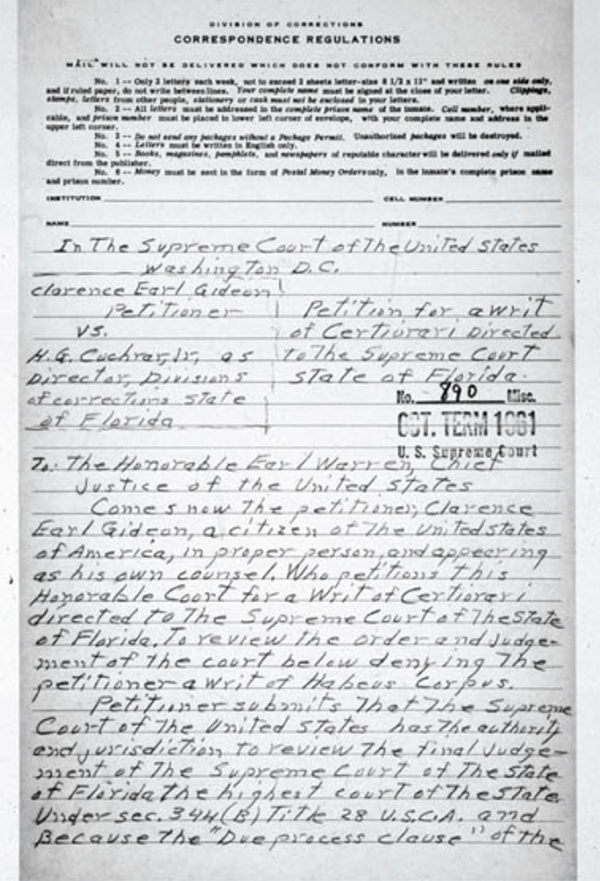ABA has a long history of advocating for indigent defense and public defenders

Clarence Gideon's petition for certiorari. (Photo by MPI/Getty Images)
March 18, 2023, marked the 60th anniversary of the landmark decision of Gideon v. Wainright, in which a unanimous Supreme Court held that indigent defendants are entitled to legal counsel in all felony cases. Since then, significant improvements have been made to public defense and judicial systems nationwide, yet Gideon’s promise of quality representation remains unfulfilled.
For more than a century, the ABA has advocated on issues related to indigent defense, primarily through its Standing Committee on Legal Aid and Indigent Defense. In fact, SCLAID (when it was operating as the Standing Committee on Legal Aid Work) stated in its 1937 annual report: “We believe that every man accused of serious crime is absolutely entitled to counsel and that, if too poor to employ one, society must furnish him that lawyer.”
Following the Gideon decision, the ABA worked with the National Legal Aid & Defender Association to create alternative models for indigent representation. We then spent decades providing technical assistance to support establishing new public defenders’ offices nationwide.
In 2002, SCLAID spearheaded the ABA Ten Principles of a Public Defense Delivery System to help ensure indigent criminal defense would be effective, efficient, ethical, independent and conflict-free. They are now recognized as the standard used to evaluate public defender systems nationwide. Former U.S. Attorney General Eric Holder has called them the “building blocks of a well-functioning public defender system.”
But simply having an attorney appointed to represent an indigent defendant does not fulfill the intent of Gideon. The goal has always been to offer quality legal representation, and that cannot be achieved when the lawyers are burdened with more cases than they can reasonably be expected to resolve.
Concerns surrounding mounting workloads prompted SCLAID to publish in 2009 the ABA Eight Guidelines on Public Defense Related to Excessive Workloads. SCLAID later commissioned studies of public defender workloads across several states, and these studies set jurisdiction-specific workload standards for public defenders. SCLAID is currently working on national public defense workload standards based on a meta- analysis of the state-based studies.
Public defenders and other indigent defense providers still face roadblocks that hinder their ability to offer quality legal representation, which is why the ABA will host an online public defense summit, “Achieving Political Independence and Manageable Caseloads in a Modern Public Defense System,” on April 13-14, 2023.
Besides SCLAID’s indigent defense work, the ABA Guidelines for the Appointment and Performance of Defense Counsel in Death Penalty Cases have been official ABA policy since 1989. These guidelines have become the gold standard for indigent defense in capital cases and assisted capital defense counsel in advocating for resources on behalf of their clients. Several states adopted the standards, and the U.S. Supreme Court has cited the guidelines in assessing the effectiveness of capital defense counsel.
The ABA Criminal Justice Section also publishes standards designed to address all aspects of establishing and administering indigent defense systems, as well as the performance of criminal defense counsel in all stages of their professional work, including a standard for an appropriate workload.
To advance these developments, the ABA Governmental Affairs Office has worked diligently to implement ABA policies, urging Congress to improve indigent defense compensation at all levels of government; to improve the quality of representation in capital cases; and to provide federal funding to support state, local, tribal and public defender offices. In response to growing shortages of public defenders, in the mid-2000s, the ABA also successfully advocated for the creation of two federal student-loan relief programs to enable law graduates with substantial student loan debt to accept and remain in lower-paying public service positions.
GAO further helps ABA entities highlight their guidelines, standards and research through testimony, letters and other communications with government officials.
ABA efforts to improve indigent defense continue today. By fall, we hope to update our principles to include revisions to workload standards, new standards on data collection and an emphasis on the importance of holistic representation. All principles will be updated to reflect how prevailing standards of indigent defense have evolved in the last two decades in response to new empirical data, research and defender expertise.
Gideon’s promise of quality representation for indigent defendants motivates justice advocates countrywide. The ABA’s unwavering commitment to advocacy, research and technical assistance has greatly contributed to substantial advancements associated with indigent defense. Despite these victories, more work remains, and the ABA will stay a forceful champion for improving the rule of law and ensuring meaningful access to legal counsel in our justice system.
This story was originally published in the April-May 2023 issue of the ABA Journal under the headline: “A Trumpet Call: The ABA has a long history of advocating for indigent defense and public defenders.”
To follow federal legislative developments involving ABA policy interests, follow @ABAGrassroots on Twitter or connect through LinkedIn.
This report is written by the ABA Governmental Affairs Office and discusses advocacy efforts by the ABA relating to issues being addressed by Congress and the executive branch of the U.S. government.



